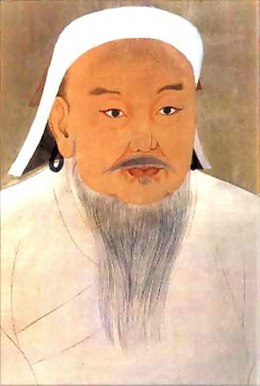Here is an interesting analysis of Genghis Khan, suggesting that an open approach to knowledge acquisition was the Mongol leader's key to success.
 |
| Genghis Khan, image from wikipedis(not a photograph) |
Genghis Khan is one of his more unexpected examples.
Genghis Khan, born in or around 1162, was the founder and Great Khan (Emperor) of the Mongol Empire, which became the largest contiguous empire in history. He has a reputation for brutality and genocide, but far less of a reputation for Knowledge Management. Ryan Holiday would like to redress this.
As he says:
Not only was Genghis Khan one of the greatest military minds who ever lived, he was a perpetual student, whose stunning victories were often the result of his ability to absorb the best technologies, practices, and innovations of each new culture his empire touched.... with each battle and enemy, [the mongol] culture learned and absorbed something new.
Holiday gives the following examples of Genghis Khan's knowledge acquisition and integration program:
- The concept of splitting his soldiers into groups of ten, taken from neighboring Turkic tribes
- How to attack fortified cities through the use of siege engines, learned from Chinese engineers
- How to hold territories through a hearts-and-minds campaign, learned from campaigns against the Jurched
- How to build cannon, learned from an innovative combination of Chinese gunpowder, Muslim flamethrowers, and European metalwork
He describes how
"in every country or city he held, Khan would call for the smartest astrologers, scribes, doctors, thinkers, and advisers—anyone who could aid his troops and their efforts. His troops travelled with interrogators and translators for precisely this purpose"As the Mongol empire grew, so Khan added to his knowledge, seeking out new ideas that he could put into practice. This openness to learning was one of the factors that enabled Khan's success.
I wonder, how open are today's business Khan's - the CEOs who take over other organisations in order to build their empires? Are they open to learning? Do they have teams of "interrogators and translators" (aka Knowledge Managers) to identify and capture the new knowledge they use in their own business purposes? Do they see each acquisition as a learning opportunity?
Or are they driven by their egos to conduct downsizing exercises (the business equivalent of massacre and genocide) with no thought to the knowledge that will be lost?
Let's not just learn from Genghis Khan; let's learn LIKE Genghis Khan.




2 comments:
Dear Nick,
Thank you for this very interesting post. Being myself a Genghis Khan fan and studying knowledge management, I'm enthusiastic about the unexpected opportunity to name both in the same sentence :)
However, I'm not entirely convinced that we're strictly talking about knowledge management here. The approach of Genghis Khan reminds me more on 'The art of war' from Sun Tzu, so widely quoted in the 'Intelligence' field. Indeed, aren't we rather dealing here with 'competitive intelligence' and 'business intelligence'?
I'm not denying the learning aspect which occurs through his acquisition of knowledge, (the famous 'Internalisation' conversion process so well described by Nonaka), but I don't think that Genghis Khan was keen on sharing his knowledge with anyone else...which is, for me, a process inherently linked to knowledge management.
Thanks Iris - how interesting to met a KM/Genghis Khan fan
I think he ensured the knowledge was spread within his organisation, taking the form to improved tactics, procedrues, approaches and capabilities. Theough his leadership he made his organition (the Mongol horde) into a learning organisation, which is (for me) good KM. I don't expect any organisation, however good at KM, to share their knowledge with their competitors, but I do expect them to acquire and internalise new knowledge.
Post a Comment